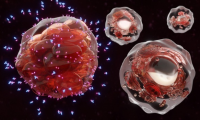-
Lilly’s Jaypirca tipped to capture 60% of BTK leukemia market, leaving AstraZeneca, BeiGene in the dust
- Source: https://www.pharma.com/marketing/lillys-jaypirca-tipped-capture-60-btk-leukemia-market-leaving-astrazeneca-beigene-dust
- 159
- January 24, 2024
-
After 17-year courtship, Sun and Taro finally agree on $348M buyout
- Source: drugdu
- 162
- January 20, 2024
-
Bayer’s Cost-Cutting Plans Take Aim at Multiple Layers of Management
- Source: drugdu
- 119
- January 20, 2024
-
China is a Key Pillar for Novartis
- Source: drugdu
- 188
- January 19, 2024
-
Roche exec says more pull incentives are needed to tackle AMR
- Source: drugdu
- 160
- January 18, 2024
-
report
- Source: drugdu
- 259
- November 26, 2023
-
Alkermes Spins Off Oncology Business with $275M to Focus on Neuroscience
- Source: drugdu
- 128
- November 17, 2023
-
Novartis Inks Potential $1.3B Contract with Korean Biotech for Small Molecule
- Source: drugdu
- 108
- November 9, 2023
-
AbbVie, AstraZeneca, Boehringer and more face FTC’s ire for ‘improper’ patent listings
- Source: drugdu
- 94
- November 9, 2023
-
More Than 60 Groups Ask Senate Leadership To Pass Legislation To Lower Drug Prices
- Source: drugdu
- 101
- November 3, 2023
your submission has already been received.
OK
Subscribe
Please enter a valid Email address!
Submit
The most relevant industry news & insight will be sent to you every two weeks.













